Time to Orgasm: How long should sex last?

Few sexual insecurities loom larger in the male psyche than the longevity of their lovemaking. Although roughly 1 in 3 men experience premature ejaculation at some stage of their lives, the issue remains a taboo topic for partners to discuss. And while it's important to maintain healthy concern for your partner's pleasure, fear about reaching orgasm too quickly can actually prove counterproductive. Worries about ejaculating too quickly can contribute to sexual performance anxiety in many cases, leaving all parties unsatisfied.
In this project, we determined to study how long men lasted in bed honestly and directly, surveying more than 1,000 anonymous individuals from Europe and the U.S. about their intimate experiences. We considered the perspectives of men and women alike to learn whether male anxieties were warranted or blown out of proportion. Additionally, we asked respondents to share their strategies for delaying an orgasm, and what they did to keep pleasuring their partners if they ejaculated too soon. Keep reading to get a crowdsourced view of premature ejaculation's prevalence and the ways people attempt to extend their ecstasy.
Orgasm Countdown: Averages and Expectations

If premature ejaculation is a relatively common phenomenon, so is the anxiety it inspires. Nearly a third of men believed they reached orgasm too quickly, although many find it difficult to seek help from their doctors, let alone discuss the condition with their friends. Interestingly, however, men lasted about 14 minutes on average – which our data suggest is an enjoyable amount of time for most women.
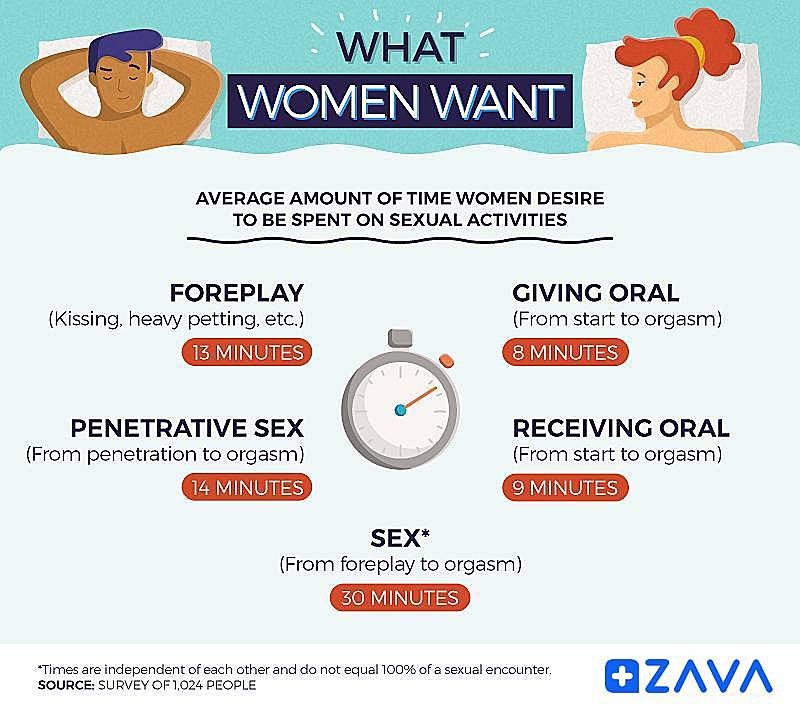
In fact, the average ideal length of penetrative sex among women matched men's 14-minute average exactly. This finding should bring some relief to men anxious about lasting for an exceptionally long time: The typical timing is actually matched between men and women, according to the average woman.
Women typically felt foreplay should last nearly as long as penetrative sex, a finding that confirms a growing body of research suggesting "outercourse" is essential to climax for many women. Additionally, women felt oral sex should ideally last about nine minutes if they received it and eight if they performed it.
These results may lend encouragement to men who fear they climax too soon to truly pleasure their partners: Alternative routes to orgasm are available. In fact, if foreplay and oral sex last for these desired lengths, there's relatively little time left in the 30-minute window women identified as ideal for the entire intimate experience.

Perhaps this flexibility accounts for the levels of satisfaction we found among women generally: Three-quarters said their partner lasted long enough for them to orgasm. We can assume that foreplay before penetration contributes positively to that result, although every couple's preferences likely differ.
Ways to Delay
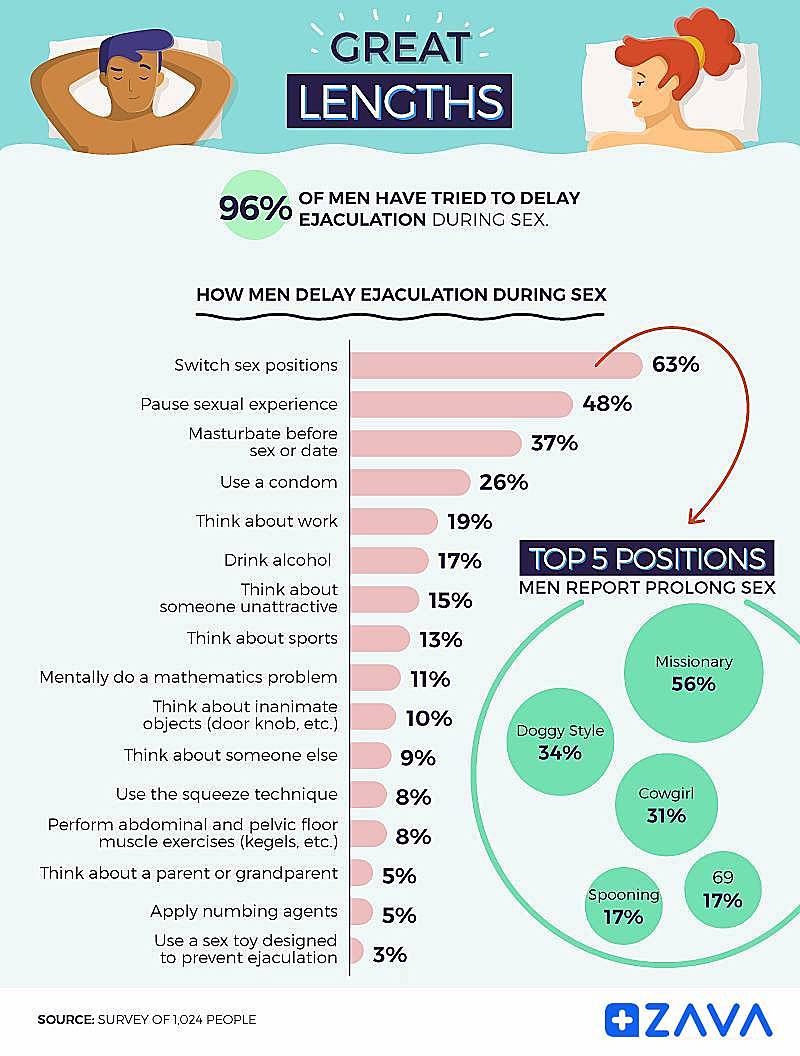
Although many men climax more quickly than they'd like, our findings suggest that's not for lack of effort. With 96 percent of men admitting they've tried to delay ejaculation in the past, only a small minority can say they've never struggled to keep orgasm at bay. The techniques men employed to address this common challenge, however, varied widely. The most common approach was a change in position; 63 percent of men said they used this technique when they felt they were approaching climax too soon. Nearly half of men reported simply pausing the action instead.
More than a third of men tried masturbating before sex or a date, a technique some suggest can relieve the tension of one's natural libido. Other common methods of delaying orgasm sought to utilise distraction: 19 percent said they thought about work, whereas 15 percent pictured an unattractive person. Sports, inanimate objects, and math problems were also commonly contemplated during sex. Even 5 percent thought of a parent or grandparent (if only Freud could comment on that result).

More than a quarter of men also reported putting on a condom to delay ejaculation. And though there are many important reasons to do so, our findings suggest this technique is largely effective. Sixty-five percent of men said a condom caused them to reach orgasm more slowly or much more slowly, and only a tiny fraction who tried it said it actually quickened their finish. Plus, some research indicates condoms don't adversely affect women's chances of reaching orgasm, so the added layer of protection won't necessarilyjeopardise a partner's pleasure.
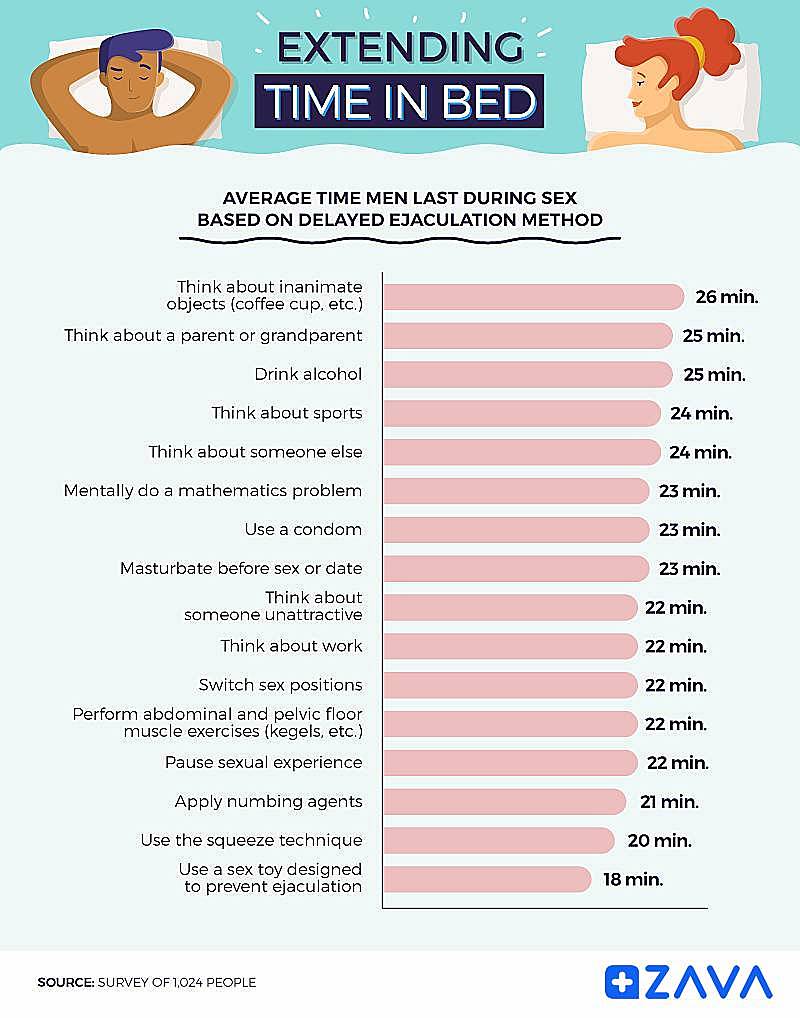
Of all the methods employed to extend sex, which seemed most successful? According to our data, some of the most promising techniques were mental: Those who pictured inanimate objects lasted 26 minutes on average, followed closely by those who thought of a parent or grandparent during the deed. Those who thought about sports, someone else, or math problems were also among the longest-lasting groups. Interestingly, men who tried the most popular method, switching positions, ejaculated several minutes earlier on average.
Women Take the Opposite Approach
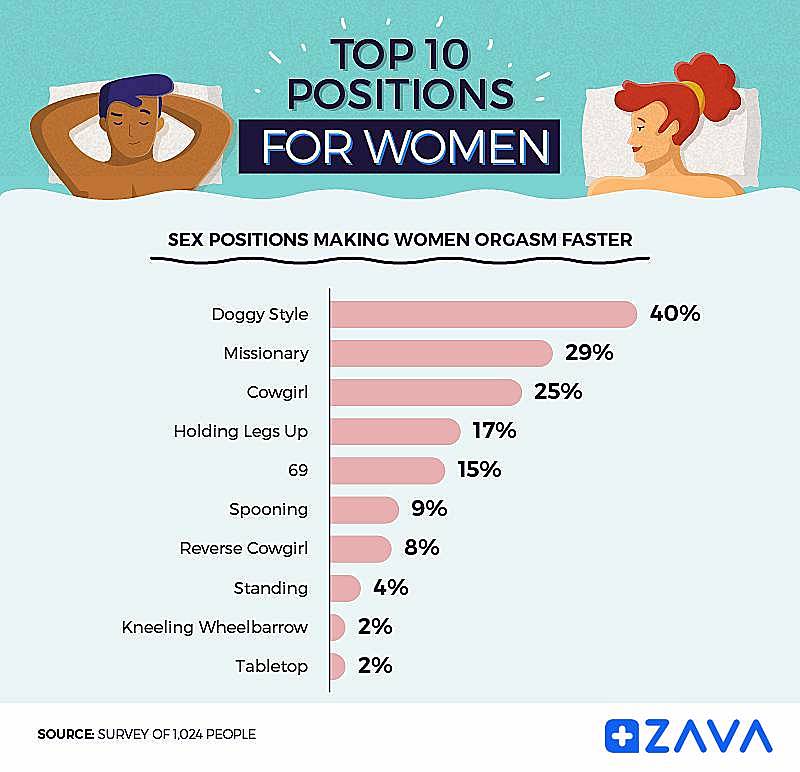
If men fear they are finishing too quickly to please their partner, women might suggest another solution: sex that puts them on the fast track to orgasm as well. For 4 in 10 women, doggy style was the preferred position to accelerate orgasm. The more traditional missionary approach had its fans as well, with 29 percent of women saying it helped them climax more quickly. And for a sizeable contingent, the speediest path to pleasure didn't involve penetration: 15 percent said 69 worked best for them.

Interestingly, however, more than 7 in 10 women suggested they could still find sex satisfying if it did not include an orgasm. Recent studies indicate women are still significantly less likely to orgasm during sex than men, and that relatively few women climax through penetrative intercourse alone. A more positive interpretation is possible: Women can enjoy the experience of sex without an exclusive focus on orgasm.
Post-Orgasm Action
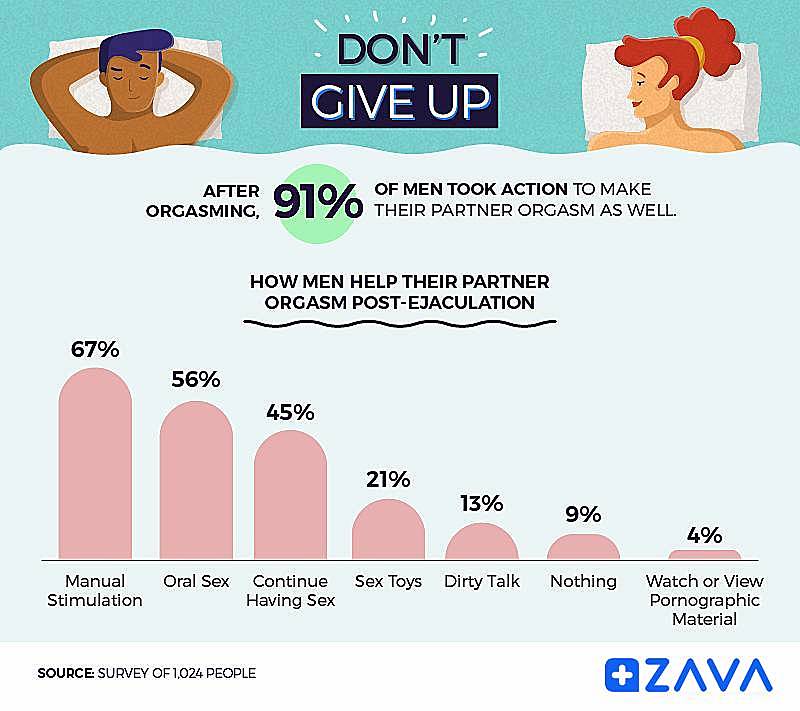
Many men fear premature ejaculation will prevent them from satisfying their partners during intercourse. Thankfully, the possibilities for pleasure can continue past the point of ejaculation, and 91 percent of men said they'd pleasured their partners after achieving an orgasm themselves. The most common technique was manual stimulation, followed by oral sex. Nearly half of men reported continuing sex after orgasm as well, although many men report losing their erections too quickly after an orgasm to keep going.
More than 40 percent of men never attempted to continue intercourse after orgasm, although this could be partly due to biology: During and after an orgasm, the human brain experiences chemical changes that may encourage cuddling more than continued arousal. But a significant portion of women took matters into their own hands if they did not achieve an orgasm during sex. Nearly half of women admitted to masturbating after sex because their partner ejaculated too soon or they simply couldn't climax during sex.
Improving Intimacy: Quality and Quantity
Our findings suggest a significant portion of men felt they reached orgasm too quickly to please their partners. But our results also suggest many positive possibilities: Men typically make an effort to delay ejaculation or continue the sexual encounter in deference to a partner's pleasure, often with success so that both parties feel satisfied at the end. Additionally, other forms of intimacy, such as foreplay, can deliver great enjoyment and eliminate pressure on penetrative sex alone. With communication and experimentation, partners can navigate the challenges of differing orgasm timing together. As with any sexual matter, don't let anxiety stand in the way of passion and satisfaction.
Nor should the fear of judgement prevent you from taking control of your sexual health. Our professional team of licensed doctors will help you with your sexual problems through discreet online treatment with services ranging from premature ejaculation and erectile dysfunction in men to hormonal contraception in women. With swift and discreet diagnosis performed entirely online, ZAVA offers the ideal mix of privacy and convenience. Plus, with speedy delivery, you can skip the trip to the pharmacist. Get the support and treatment you deserve today.
Methodology
We collected responses from 1,024 sexually active European and American men and women from Amazon's Mechanical Turk and Clickworker. Forty-one percent of participants were women, and 59 percent were men. Participants ranged in age from 17 to 75, with a mean age of 36. Participants were excluded if they were clearly not paying attention (e.g., failed attention check question or entered obviously inconsistent data).
The data we are presenting rely on self-reporting. There are many issues with self-reported data. These issues include but are not limited to: selective memory, telescoping, attribution, and exaggeration. No statistical testing was performed, so the claims listed above are based on means alone. As such, this content is purely exploratory, and future research should approach this topic more rigorously.
Fair Use Statement
If you'd like to help share our results with the world, you're welcome to use our images and information for noncommercial purposes. When you do, please hyperlink to this page to attribute us appropriately.
Explore ZAVA services
| Service | Treatment | |
|---|---|---|
| Men's health | ||
| Women's Health | Microgynon, Cerelle pill, Cerazette, Yasmin pill, Lucette, Rigevidon, Cilique, Evra patch |
|
| General Health | ||
| Sexual Health | ||
Genital Chlamydia and Gonorrhoea Test, Oral Chlamydia and Gonorrhoea Test, Extended STI Test, Chlamydia Test, HIV Test, HPV Test |
||
| Chronic Health | ||
Atorvastatin, Simvastatin, Rosuvastatin, Cholesterol Test Kit |
||
| Travel Health | ||